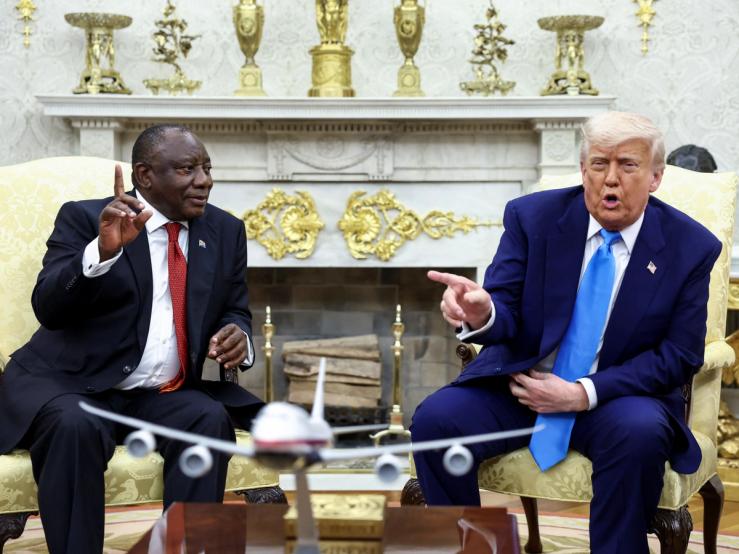In Donald Trump’s Oval Office — a space where egos clash and narratives collapse — Cyril Ramaphosa didn’t flinch on Wednesday. In the view of the country’s political leadership, South Africa’s president walked out with his dignity intact and his country’s name above water.
Measured on the Zelenskyy Scale, the new standard for dicey White House meetings, Ramaphosa scored something like a diplomatic draw: He was calm and controlled, and he resisted going off-script as he was, like the Ukrainian president, ambushed and berated. This wasn’t a negotiation. It was a reputational defense mission. He faced a president in a meeting that could’ve easily descended into a geopolitical brawl.
Trump came armed with clips of renegade South African politician Julius Malema chanting, “Kill the Boer,” and conspiracies of a “white genocide.” It had all the makings of a trap. But Ramaphosa came prepared — flanked by global golf icons from South Africa and intermediaries trusted in both business and politics. South Africa’s wealthiest man, Johann Rupert, was in the room, quietly shaping the tone, as were figures attuned to Trump’s language of ego, legacy, and deals.
Ramaphosa sidestepped Trump’s theatre by offering calm rebuttals — that crime in South Africa affects all races, that reform is underway, and that the US can choose to be a partner, not a critic. He did it with emotional intelligence and a quiet touch of diplomatic choreography. In that room, across from Trump, Ramaphosa looked more at ease than he often does here at home — where politics is more brutal, the problems more intractable, and the audience far less forgiving. Back in South Africa, lawmakers across party lines found themselves quietly cheering as they watched him on television — briefly forgetting the real challenges facing Africa’s most industrialized nation.
South Africa has long struggled to shake off a global image warped by social media noise — claims of genocide, reverse racism, and collapse. Those claims come from a variety of sources: from marginal South African voices like Malema’s; from the inflammatory rhetoric of the white nationalist AfriForum group; and from legitimate concerns about the workings of a land reforms bill, which can turn into dangerous speculation about land grabs in the mold of Robert Mugabe’s Zimbabwe. Trump has amplified those interwoven narratives, accusing Pretoria almost weekly of “bad things.” This was a moment to reset the narrative — not just for Trump, but for the wider world.
Still, a lot remains on the table.
South Africa didn’t walk away with a trade deal. The African Growth and Opportunity Act (AGOA) trade pact remains in limbo. Renegotiating this crucial agreement, which underpins billions in South African exports to the US — even with a 10% tariff compromise — would be better than drift.
Then there’s Elon Musk.
The Pretoria-born tech billionaire has amplified the “white genocide” myth more aggressively than most. His global platform on X and beyond has helped shape a warped narrative about South Africa — one that informs Trump’s own rhetorical attacks.
There are two strategic options. One: dismantle the genocide myth so convincingly that even Trump walks away from it — severing Musk’s ideological tether to the narrative. Or two: outflank him. Draw Starlink into South Africa not just as a service provider, but as a real investor. Infrastructure. Jobs. Partnerships. It would be a symbolic coup: the prodigal son who publicly disdains his homeland returning not in apology, but through relevance and capital.
Because in diplomacy, as on the golf course, it’s not always about the power of the swing. It’s about knowing when to play for a position.
Ramaphosa didn’t just hold his ground. He reminded the world — and perhaps his own party — that in an era of noise and populism, restraint is a kind of power. But symbolism fades fast. The real task is to turn that restraint into reengagement: with investors, with allies, and with the truth South Africa still needs to tell — on its terms.

